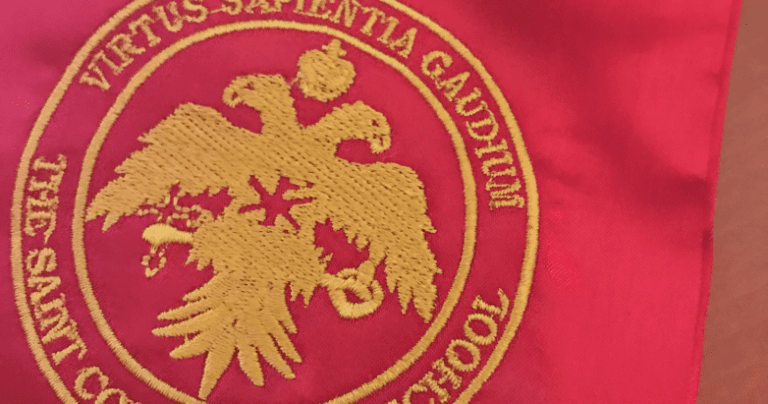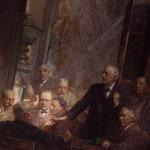
Williams Jennings Bryan stood in Dayton and battled for the humane. He was no scholar, but his opposition to Darwinism, whatever the merits, came from a fierce hatred of the Darwinian justification for the killing fields of World War I. This misuse of science (or even philosophical Darwinism) kept a certain kind of classically educated leader comfortable with the deaths of millions. The fit would survive having conveniently arranged for back-of-the-lines jobs. Industry and creativity would boom, because the demands of the War would bring full employement and demand for new weaponry. The military would produce new weapons using innovative technology that after the War would make things better for those who survived.
Bryan, progressive and Christian, hated war and despised those who ground through a generation and failed to see the evil they had done.
Christians reviving classical education should note that the classical education of the late Victorian and Edwardian era did this evil and so should be careful to avoid reviving the evils of racialism and colonialism. These false ideas were not necessary to classical, Christian education, and were contrary in fact to classical, Christian education, but grew like a cancer in (for example) the classical system prior to World War I.
We cannot pick up or merely revive that education. In fact, World War I had to lead to an accounting: what had gone wrong? How had the brightest and best gone so badly? This was particularly true when one considers that too many educated folk who opposed the War fell into evil ideologies like Bolshevism as the solution. World War I was bad, but the evil kept coming.
Bryan and some Christians had too simplistic a take on the problem and developed a suspicion of liberal arts and classical education because they saw the harm that had been done. Fundamentalist responses had the merit of seeing the evils, but with a solution that could not have maintained the goods of science and culture and simultaneously spread them.
The analysis of the white American fundamentalists acccepted the “scientific racism” of the time, for example. Bryan himself had opposed the Spanish American war and colonialism up to a point, but he was inconsistent. Education needed a cure from within, but Bryan and the fundamentalists had never been within the system so missed the virtues that remained.
Yet we must not lose the evils that a misunderstanding of science and a loss religious or virtue training produced in classical education. Things went wrong.
The common image of God in all humankind was denied in colonialism and mitigated in class structure.
A classical education exposed students to Aristotle and his much abused section in Politics I.6 about natural slaves. The powerful found it easy to create a hierarchy of “races” that justified exploitation. Any check in classical literature to this idea was ignored. The Bible was twisted to show the same hierarchy. Criticisms from global scholars and Christians in colonized lands were ignored. Finallly, science was also twisted to support the same power dynamic.
The power of classical Christian education, and the safety, had been the checks and balances of philosophy, theology, and natural philosophy (science) on the constant temptation to read, reveal, or report what we wish to read, reveal, or report. One might be twisted, but the others would slow down the self-serving error.
Human rights were also denied by class structures within the nation that defended injustice. The white poor were driven to death in industry. The leaders justified it by a selected reading of the classics, the Bible, or Darwin.
What was missing?
The dialectic tension of classical education had been destroyed. Ideology (either of the powerful or the revolutionary) and not discussion was key. Science might have checked this, but alone, science is easy prey for the ideologue. The classically trained misused science to put Christian ideas in a subordinate place.
Orthodox Christianity was pulverized or ignored in the “outer world.” Christianity was reduced to merely affective, a “woman’s place.”
Perhaps, another universal view could have replaced Christianity in the partnership with classics and science, but nothing did. No ethical system or worldview capable of educating the mind and heart in virtue replaced Christianity in the educational system. None ever has. Is it possible to sustain classic and scientific culture without a largely Christian population or value set?
We cannot know as nobody has done it yet.
In the time running up to World War I, too many men (and they were almost all men) thought of truth as brutal and grace as cut off from reason. A man was tough (Jack London, Theodore Roosevelt). The private sphere, the realm of the woman, might be tender, but in the greater world, manly virtues (brutal takes on Aristotle, Darwin) had to prevail. Read Heart of Darkness to see the result. Nature was red in tooth and claw, the nursery had to be left behind by men, even with regret and respect.
World War I was not the start of the trouble. The foulness was being practiced on much of the world through colonialism before it turned on its propagators in World War I.
William Jennings Bryan was on to something.
Moral and religious arguments against inhumanity were reduced to “womanly” sentiment in degenerate classical education. Humility is the key trait that faded away.
Charles Dickens tried, but failed to stop this path.His book Hard Times brutalized the turn toward ugliness in education. This helped. The character of Scrooge in Christmas Carol pictured the limits of inhumane business practices. Society did not need to be Darwinian. We could choose to do better as (Dickens would have said) the Savior showed us.
Yet to win against the cultural drift, Dickens (too often) reduced morality and religion to sentiment. His best case was the ugliness of the dark, Satanic world that was being created, but he lacked the education (classical and Christian) to show that both were being abused and marginalized.
Dickens, like Bryan, did not know how to respond to misuses of science to support evils that were occurring long before Darwin.
Gone was the hardheaded, soft-hearted religion of a great man like John Chrysostom: world class classical education with the humility of a revelation of God in the person of Jesus Christ. This combination gave him the courage to oppose evil rulers and the humility that kept him from abusing the power of his eloquence. This pastor, leader, philosopher, theologian refused to bow to power or choose between reason and passion. Instead, he allowed his deepest soul to keep the creative tension between the two.
The eagle of Constantinople had two heads with one body: a dialog of equal powers that could end only in death. This classical Christian education where the Greek philosophers were read and theological training continued together for almost the entire thousand year life of the City was good.
Humility is “to know yourself.” Moderns before the First World War began to reduce this to self-understanding when mostly this was to know one’s place in justice without the community and the cosmos. When one stands before the good God, then one knows one is not such a much. Humility is a natural result of a proper vision of God and cosmos.
Humility is missing in too much pre-World War I classical education: the future masters of creation were being trained. In Mary Poppins (1964), the father seeks a nanny to raise children to rule in the Empire . . .in the Age of Men. This is funny if not taken seriously, but the humor fails if taken seriously. Humility lacking the powers of 1914 took themselves deadly seriously.
Sign up for the classical education that learned from World War I: college and K-12.

———————————————












